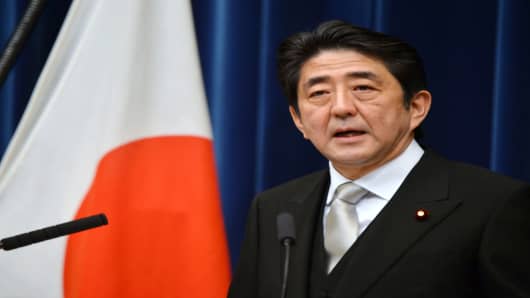I read Paul Krugman's column on Japan on the plane back from Tokyo yesterday. He is right on two counts: Japan is attempting a paradigm policy shift with potential systemic implications; and sustainability and success are not certain.
Prime Minister Shinzo Abe has returned to office with a well-defined mission and related determination: He is committed to jarring Japan out of too many years of inadequate economic growth, price deflation and a general loss of confidence in the country's economic potential.
To fulfill his mission, the Prime Minister has moved quickly on two fronts: fiscal stimulus and placing pressure on the Bank of Japan for more aggressive monetary policy.
Markets have responded strongly, bolstering business confidence and fueling a palpable sense of optimism in Tokyo.
In just two months, equities (as measured by the Nikkei index) have surged by 20 percent and the yen has weakened by over 10 percent versus the dollar. Meanwhile, interest rates have been relatively well behaved.
Since markets are in the business of trying to anticipate future developments, five issues appear particularly important in the period ahead:
First, fiscal stimulus would need to take hold and impact aggregate demand in a manner that is viewed as durable and meaningful.
Second, a new round of unconventional policies by the Bank of Japan would need to be anchored by a visible and realistic target to serve as a credible forward policy commitment - thus the current debate on a 2 percent inflation target and some mention, though mainly limited to a few academics, of a threshold level for the yen (as the Swiss did for their currency, though this is much more problematic for Japan).
Third, Japanese society would prove willingly to tolerate the micro costs of such a policy shift, starting with a sharp immediate rise in the local cost of oil.
Fourth, the government would need to continue to gain political momentum, especially ahead of the August elections for the upper house.
Fifth, and very importantly, all this would need to be accompanied by the design and implementation of deep structural reforms that substantially improve the competitiveness and responsiveness of the Japanese economy.
There would be a considerable payoff if these conditions are met, including a beneficial change in private sector expectations. Under these conditions, Japan would gain from greater private sector investment (domestic and foreign), higher growth and, thus, better longer-term debt dynamics.
Experienced Japanese observers are quick to urge caution. The requirements are considerable. They could strain the authorities' implementation capabilities. And, in some respects, they could run counter to some deeply entrenched factors, including demographics and a naturally cautious policy inclination.
Also, there is little room for policy error. Specifically, if higher economic growth (both nominal and real) does not materialize, the country could face worsening long-term debt dynamics; and if interest rates rise too quickly, household and institutional balance sheets could come under some pressure.
(Read More: Nikkei's Stunning Rally—Why It's Time to Be Cautious)
Paul Krugman is right. Japan has embarked on an historic policy experiment. Its outcome - whether positive or negative, and it is still too early to tell - will be consequential both for Japanese society and for the global economy as a whole.
Mohamed El-Erian is the CEO and Co-CIO of Pimco, which oversees nearly $1.8 trillion in assets and runs the Pimco Total Return Fund, the largest bond fund in the world. His book, "When Markets Collide, " was a New York Times and Wall Street Journal bestseller, won the Financial Times/Goldman Sachs 2008 Business Book of the Year, and was named a book of the year by The Economist and one of the best business books of all time by the Independent (U.K.).


